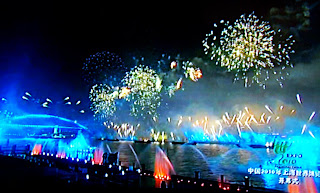
Speaking at the Chinese Communist Party's National Conference on Propaganda Work in March 1957, Mao Zedong told the assembled crowd that, "The Communist Party does not fear criticism because we are Marxists, the truth is on our side, and the basic masses, the workers and peasants, are on our side." , But criticism is exactly what China's Communist Party fears the most. It also fears the dissemination of the truth and that the workers and peasants may not be as loyal as they once were.
Free speech is not readily accepted in China, despite statements to the contrary by its present leaders. And those who criticise its achievements are soon rounded up by authorities. The latest focus of criticism is China's second coming out party, the EXPO 2010 currently being held in Shanghai.
Long before the EXPO 2010 started, the Propaganda Department had issued notices to newspapers and major web portals insisting on positive reports.
Despite all the chaos during the opening, most of the official reports remained positive and there were very few negative comments online. Western media focused on long queues in searing heat, disappointed visitors and the extreme security. But China's official media spoke of the extravaganza on show. There has also been little discussion of the displacement of residents to make way for the exhibition or the disruption for foreigners who live in Shanghai.
One Chinese blogger who did air his point of view soon found himself being hauled off by local police. Blogger
Bad Friend was summoned by security police for interrogation over tea upon writing an article, 10 sins of EXPO 2010, on his blog. After the tea session, he wrote another article, "La Dernière Classe", recording the conversation between the security police and himself. The exchange reflects the ideological conflict between a party-state nation represented by the security police and a people-orientated nation represented by the student blogger. The two original posts were deleted but still circulated widely online [
Global Voices].
In particular the blogger criticised the fact that many residents near the Huangpu river were forced to move to make way for the EXPO. He highlights what he calls a violation of human rights with the Shanghai government monitoring over 100 thousand foreign residents, demanding they return home no later than 11pm. "This is a violation of personal freedom and privacy… And recently, human rights activists Feng Zhenghu's home was raided by police after he proposed holding an 'Injustice Expo'. His computer and modem were confiscated," the blogger writes. There is no demonstration zone, something that did exist though under strict supervision at the Beijing Olympics. This implies, the blogger asserts, that "all demonstrations during the Expo will be illegal as we don't have freedom of assembly and demonstration in China."
There has been some talk of the money poured into what is arguably the biggest ever EXPO. A
Bad Friend calls it "a wasteful decorative engineering project" and compares the money allocated to the EXPO and other more pressing matters. "This Expo becomes the most expensive world Expo as the government has spent 400 billion yuan on it. The Central government only allocated an RMB 0.15 billion relief fund to fight against the drought that cost RMB 20 billion in economic damages and affected 60 million people. During the "Two Congresses", officials said that it only took RMB 160 billion annually to achieve universal health care. The spending on people's livelihood is much less than all these decorative projects…"
The EXPO has also destroyed cultural heritage with parts of Shanghai's old city being demolished. In what appears to be a wanton waste of resources many of the Expo pavilions will be demolished at the end of the exhibition, though a small number of them will be preserved in order to boost the property market.
Security is high both in and around the EXPO site. But some restrictions go beyond the banning of knife sales and the prohibition of lighters and matches on the exhibition site itself. The government, under the pretext of improving the city's look, has restricted people from hanging their clothes outdoors and stopped people from wearing pyjamas in the street. Real name registration is now required when buying chopping knives. Recently the Shanghai government also demanded residents to show their ID when buying rat poison and pesticides…
During the Beijing Olympic opening ceremony, western media focused on a miming singer and fake fireworks that had been enhanced with computer graphics. The Shanghai EXPO has not escaped criticism either. The plagiarized Expo theme song has been talked about a great deal in foreign news reports and Bad Friend also pours scorn on the incident. "We have lost our face before the opening of Expo. The theme song, estimated to have costed 10 million yuan has become a national shame…," he says.
Even the EXPO mascot Haibao has been liked to a copy of an American cartoon character called Gumby and more recently the trademark logo of a white goods manufacturer called Henan Xinxiang Haibao [
Telegraph].
The slogan of EXPO is "Better City, Better Life" something which the Shanghai blogger find rather incongruous given the disruption surrounding the event.
But while western media is unimpeded in its commentary, the blogger was summoned by security police. The main purpose of the exchange, apart from delivering a warning to the blogger, was an examination of his thoughts with an attempt to identify the source of his ideas and whether or not there was a social network behind the scenes. The blogger called the tea session "La Dernière Classe" and wrote about his discussion with the local authorities.
He was asked to explain his opinions, and while he said he was not against Expo as an event, he was against its politicization. "The Expo, as an exhibition of culture and science development, can be an enlightening event in China. It is a platform for us to understand the world more. However, it is not necessary to turn it into a propaganda and post so many restriction on people's life," he told them.
Asked where he received his ideas he explained he read foreign media sources which he described as "more independent and therefore trustworthy." The police official insisted "they are not that trustworthy" and that "they like to report negative news."
Freedom of expression, the blocking of Internet sites and even the Google spat with China's government were discussed as were issues over government corruption and openness. "Our country is getting strong and you only focus on the dark side," the official told the blogger.
Conceding there had been some changes the blogger said, "The country has progress but not its people. There are many many such kind of problems."
And the end of the discussion the official told the blogger, "I have three demands, please remember: 1. don't write those kind of article any more; 2. Be objective, rational, accurate and all-dimensional in dealing with issues; 3. I wish you can find a good job. You have to deal with your life first and some issues are not of your concern."
The blogger was then allowed to leave, though his name will no doubt be marked by authorities as 'subversive'.
tvnewswatch, Beijing, China



















